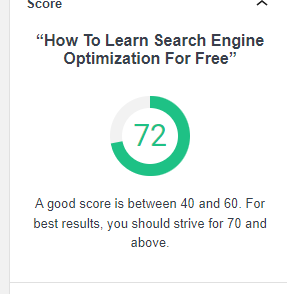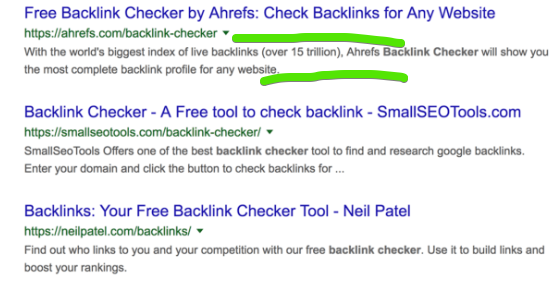How to learn search engine optimization for free and stay ahead of Google. Changes are regular and you need to be ahead of the pack
Estimated reading time: 10 minutes
Table of contents
- SEO and its effect on you
- It all starts with the Keyword an ever-changing environment.
- Your Keyword is included in your heading
- Google has not finished yet
- A review of your meta description
- You need links to add more oomph to your writing
- Images need specific care to please Google
- Use your Keyword sparingly but often
- You are not writing a book
- Content over quantity who wins?
- How to learn search engine optimization for free
- Conclusion
SEO and its effect on you
There is a lot of talk about SEO and the effect it has on your work. This is principally the way that Google rates you in search engines and offers you a chance of climbing through the many pages around your chosen niche.
The question is can you learn the basics or do you need to take off and go to a high-priced college to get a degree?
Both are true but let's start with the easy way, finding our way without paying any money.
It all starts with the Keyword an ever-changing environment.
When we talk about keywords we go back to the eighties when there was not a lot of material on the internet. Google told us that to find something just type a word into the internet and we shall match a solution.
I can remember many a debate about where this could go. Google made no money and how could they keep adding to an expanding dictionary?
Next came the term long tail keywords which meant throwing a few words together instead of just one simple word to broaden the search term. This made searching a lot easier and found results that you wanted more often.
But no, this was not enough with a growing number of searches and results we wanted more. so we invented key phrases. A word with a long tail and even a location or more.
Mind-Blowing Google Statistics and Facts. There are over 70,000 Google searches each second. That's almost 227 million an hour and about 5.4 billion Google searches per day.
Google
Your Keyword is included in your heading

Your Keyword is included in your heading and your Meta description but here we start with the difference of opinions among the experts.
Two important Word Press tools are Yoast SEO and AIO SEO which both tell much the same story. They give you a list of accomplishments and rank you on them.
The general consensus is a four-word headline and any more and you get the dreaded x
I also subscribe to Monster insight which has a nice headline analyzer. They rank your headline.
The monster wants up to 55 characters and eight words to give you a pass mark.
My understanding is that this meets the Google search intent better by providing a more descriptive phrase. Remember we must also please Bing in exact match searches.
I use Monster Insights because it works.
Google has not finished yet
Google is not finished and not by a long way. Not to be daunted by the increasing number of searches they continue to look for better and faster ways of achieving results.
They have now entered the time of Artificial Intelligence or AI to make some sense of the mess they are in. Basically, that means using robots to make decisions more quickly and accurately.
We now stand and applaud User intent.
Google now places searches to a position that Google believes they want and not with exact match keywords as in the past.
As a side note Bing, Yahoo, and the Russian site Yandex have stayed with exact match keywords but the Chinese site Baidu has followed the Google example.
Therefore matching your search following has got a lot harder.
User intent will pull in location as well as popular information to rank your site.
Suppose the term best hiking tracks in Yukon is searched and found but the readers were not overly satisfied so they switched to the 5 best hiking tracks in Yukon and stayed on the page.
The first search would quickly fall down the page rankings and the latter would move up and take the prize position.
Therefore Content is still king. Backlinks matter, pictures help, and subtitles keep readers
A full description of this was done at Backlinko a long read for those that want more.
Getting to page one is the first goal but obtaining a position in the first three places on page one means you have a chance of being read.
How to learn search engine optimization for free and write a great Meta
A review of your meta description
This is the description underneath your search term that describes what the site is about.
The Main WordPress SEO tools by Yoast and AIO still insist on a 150-word meta description to give you a pass mark.
However, a popular trend among writers is that Google will write the meta for you and do a better job because they know what they want. I am not one that subscribes to that theory because the meta has very high relevance.
if you manage a top three position in a search term you will get some traffic.
1 – 31%
2 – 25%
3 – 15%
But, the one with the best Meta description that answers the search need will get the nod despite the statistics.
The fourth best result is the last free one on the page because they can't find what they want.
The time a searcher takes to choose this is just parts of a second so it must be good.

This is unfair in that they are all good and follow the rules but someone always wins.
One last theory on Meta descriptions
You are told there are a maximum number of characters in your Meta and not to exceed them or you will be penalized. Again the latest theory is that longer is better and showing a three-dot ellipsis ( Greek meaning omission) gives you a chance to read more.
Again, as good as this sounds the searching eye wants an answer, not a long-winded explanation so short is better.
You need links to add more oomph to your writing
Your Blog or web is just not enough on its own. When readers want more because the subject is long and involved send them away.
First of all away to other posts you have written that build on the subject. This gets traffic flowing through your posts building authority. You know what you are talking about.
Google likes internal links so use them.
Links to outside material on the same or a similar subject. Google also insists this is a part of SEO.
One important part of links is telling Google not to follow ones that go to an affiliate or paid site. Google doesn't want to rank these sites so has a drop-down box to click as no follow.
This brings me around to authority
Authority is recognition that you know what you are talking about. Certainly, if you have high qualifications it can help, and using someone else to boost your ranking is certainly useful.
I said it was fact and the medical team at the local University backed it up with a survey. This is using other material to support your own.
Images need specific care to please Google
Images, graphs, and pictures of all kinds need to be named with what they represent. You can use your keyword in about 50% but the others should tell a blind person what the image represents. There is generally an Alt Description drop down on the right sidebar to do this.
When you use an image you should ask yourself if it represents truly what your article is about and does it help the user experience. Then name it as such.
Writing for the mobile experience
Whilst on the image subject we should note that Google checks your work on a Mobile platform first for acceptance into the top class. Therefore your content should be designed around a little screen. Furthermore, the use of large images will distract from your performance> Google even goes as far as a page to check your small screen acceptance
Use your Keyword sparingly but often
I guess that is a bit of an awkward headline but you do need to use your Keyword several times in an article but without going berserk.
In the olden days, it was advised to saturate your article with keywords but that is now frowned on. Maybe once every three hundred words is a maximum.
Using Synonyms helps the flow of your work and hides your keyword density and is acceptable by Google
You are not writing a book
You are not writing a book you are writing for a specific purpose and Google sets out some pretty demanding rules around style.
First of all, is the number of words in a blog as an example. When I started writing 300 was normal and now that number is 1400 for the average blog. Yes shorter and even out to 5000 words is ok if you can keep the readers on the page.
Every time someone bails from your page you get a minus point so keeping them reading is important.
Using subheadings
You need to add a new heading at least every three hundred words and less is better.
The more headings you have the more readers who like to skim your page can be bought to attention on interesting subjects.
So short sentences and lots of paragraphs are the order of the day.
Content over quantity who wins?
This is a two-horse race and a dead heat so whilst it is an easy answer it needs to be further explained.
Quantity.
There are only so many readers on a subject and most of them loiter around page one so your traffic figures will be low in your early days. This is part of the game so building a portfolio of products will increase your traffic and visibility so quantity is really important.
Content
If your readers bail at the first opportunity you get more bad ticks from the gods. The time spent on your page is an important ranking item and that is one reason for enticing them with color, pictures, graphs, and other exciting inclusions.
Adding YouTube into the mix
Youtube is a much-used search engine and by including a link and or embedded video you will gain a lot more screen time. People get lost on YouTube as they find more exciting rubbish to waste a few hours on, don't laugh we have all been there.
How to learn search engine optimization for free
We have covered a lot of the basics in this quick lesson that will allow you to compete on the market and aim for the Utopian first-page position.
- Keywords are the most important element.
- Writing for the small screen is necessary
- A good meta description gets the eyes and then the click
- Internal and external linking is necessary
- The basics of writing
- Adding images and color
- Creating winning content
- Keeping readers on-site with Youtube
Not a bad start to a long career in great Google scores.
Conclusion
Yes, you must understand the basics of SEO to have any chance of matching wits against those who hold all the power. Some are experts and some have been doing this for years so going in without some idea of how to win the race will end in disappointment.
I have given you enough to start your A-game and get a good mark on Google so start writing and enjoy the journey.